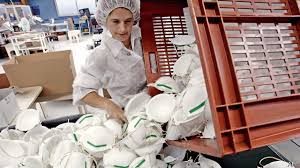Much about the pandemic sweeping across the world is unprecedented, but one aspect is all too familiar: price gouging in the wake of a disaster.
關于這場席卷全球的流行病的許多方面都是前所未有的,但有一個方面我們都太過熟悉了:因災難而導致的哄抬物價。
In New York police arrested a man who had stockpiled medical gear, allegedly selling it for a 700% mark-up.
在紐約,警方逮捕了一名囤積醫療設備的男子,據稱他將醫療設備以700%的溢價出售。
Indonesian authorities seized 600,000 masks from hoarders. In Italy the government launched a probe into sky-high online prices for basic protective equipment.
印度尼西亞官方從囤積者手中沒收了60萬個口罩。在意大利,政府對基本防護裝備的天價網絡售價展開了調查。
Such crackdowns are popular. Who could possibly endorse disaster profiteering? Many economists, as it turns out.
這樣的打擊很受歡迎。誰會贊成發災難財呢?事實證明,許多經濟學家會。
To be clear, it is not that they want the public to miss out on life-saving products. Quite the contrary.
需要明確的是,這并不是說他們希望公眾錯過拯救生命的產品。恰恰相反。
They believe that soaring prices stimulate greater output, and that policies to cap costs might limit supplies and so do more harm than good.
他們認為物價飛漲能夠刺激更多產出,而限制成本的政策可能會限制供應,因此弊大于利。

In 2012 the University of Chicago surveyed 32 eminent economists about legislation that banned price gouging during a weather-related emergency.
2012年,芝加哥大學就一項立法對32位知名經濟學家進行了調查,該立法禁止在與天氣有關的緊急情況下哄抬物價。
Only three supported the ban; more than half criticised it. Similar views have been aired in recent weeks.
只有三人支持該禁令;超過一半的人批評了該禁令。最近幾周也出現了類似的觀點。
An economist with the Cato Institute, a conservative think-tank, lamented the "madness" of anti-gouging rules,
保守派智囊團卡托研究所的一名經濟學家對反對哄抬物價的“瘋狂”表示遺憾,
saying that profits are what entice firms to meet rising demand for safety equipment.
他表示利潤是吸引企業滿足日益增長的安全設備需求的原因。
Yet a closer look at one key piece of equipment—masks—during the coronavirus crisis shows that this standard view needs revamping.
然而,在冠狀病毒危機期間,仔細觀察一個關鍵設備——面罩,就會發現這種標準觀點需要改進。
Economists are normally loth to tamper with prices, the most basic element of any market. But little about this pandemic has been normal.
經濟學家通常不愿干預價格,而價格是任何市場的最基本要素。但是關于這次大流行的情況大部分都不正常。
Price signalling alone would have been inadequate to the challenge of ensuring vast increases in supply.
僅靠價格信號不足以應對確保供應大幅增加的挑戰。
First, consider the manufacture of masks. They might look simple, but producers need sterile factories and sophisticated machinery to churn out melt-blown fabric.
首先,考慮口罩的生產。它們看似簡單,但生產商需要無菌工廠和精密的機器才能大量生產熔噴織物。
譯文由可可原創,僅供學習交流使用,未經許可請勿轉載。












